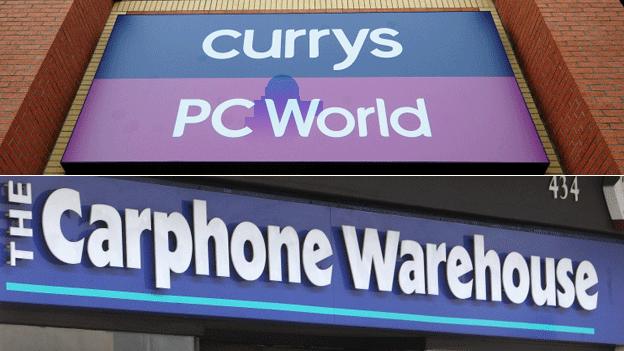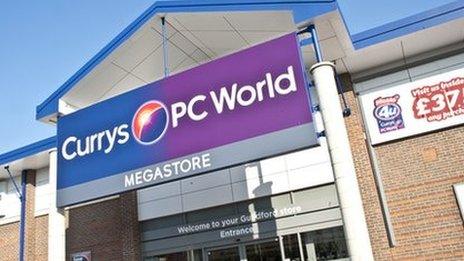Dixons and Carphone Warehouse shares drop on merger
- Published
Dixons Retail CEO Sebastian James: "Overall our plans see job growth and not job reductions"
Shares in Dixons Retail, the owner of Currys and PC World, and mobile phone retailer Carphone Warehouse have fallen sharply after the two companies announced a merger deal worth £3.8bn.
The new firm will be known as Dixons Carphone, with ownership split equally between the two firms' shareholders.
But analysts expressed scepticism about the proposed link up.
Shares in Dixons closed down 10.3% on the news, while Carphone Warehouse shares were down 8%.
Dixons operates more than 500 Currys and PC World stores in the UK and Ireland.
Carphone Warehouse operates more than 2,000 stores across Europe.
The two firms disclosed in February that they were in talks about a tie-up.
Dixons chief executive Sebastian James announced the deal as he gave details of the firm's trading performance for the financial year.
He said full-year underlying sales were up 3% and like-for-like sales, stripping out the effect of new store openings, were also up 3%.
Dixons said its full-year profit was expected to be "at the top end of market expectations" of £150m to £160m.
'Seamless experience'
Mr James added: "Today we also announce that we are setting out on a new journey with Carphone Warehouse and it is good to be in such a strong position as we embark on this adventure.
"The ability to take what we have built in electrical retailing and add the profound expertise of Carphone Warehouse in connectivity would make us a leading force in retailing for a connected world.
"Together we can create a seamless experience for our customers that will enable technology to deliver what it promises - that is, to make their lives better."
The merger will save the companies £80m a year from the 2017-18 fiscal year onwards, Dixons said.
"This is a very rare thing, a merger which is based on what is happening out in the world, rather than internal navel-gazing," Mr James told BBC Radio 4's Today programme.
He said the aim was to exploit the soaring number of devices connected to the internet, since Dixons sold them and Carphone Warehouse connected them.
He added that the merger should not result in any branch closures.
Phones and fridges
For its part, Carphone Warehouse said "significant job creation" was expected as part of the deal, "resulting in an increase of approximately 4%".
However, some existing staff will be affected. Dixons said there would be job cuts of 2% of the merged company, "as a result of the rationalisation of certain operational and support functions".
BBC business editor Kamal Ahmed says the risk is that the merger does not tackle the big issue affecting all retailers - that there are simply too many physical stores in the UK and too many of them are trying to sell phones and fridges.
David Alexander, consultant at Conlumino, said: "Although there are plenty of reasons to view the merger in a positive light, the history of [mergers and acquisitions] is littered with the corpses of failed unions.
"Carphone Warehouse itself is no stranger to this, having seen its partnership with US electronics giant Best Buy in 2008 peter out three years later in the face of intense competition from Dixons."
Independent analyst Louise Cooper said there would be "much scepticism" about the idea that the merger would produce better growth.
"Two past-their-sell-by-date retailers merging does not an Amazon make," she said.
Dixons Retail owns the Elkjop group in the Nordic region and the Kotsovolos retail business in Greece.
Last year, it sold its loss-making online retail business Pixmania to German industrial group Mutares.
It has also disposed of subsidiaries in Italy and Turkey, as part of its strategy of "focusing on markets where we are leaders".
- Published24 February 2014

- Published5 September 2013
